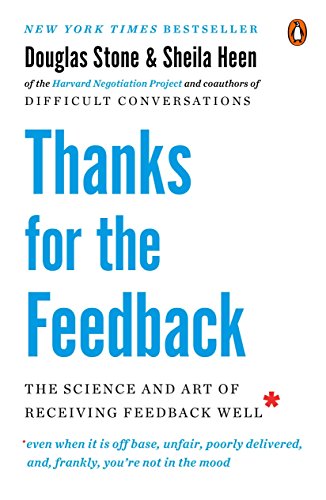Thanks for the Feedback
Think you might want to read this book?
In Thanks for the Feedback, Douglas Stone and Sheila Heen address an incredibly important, yet rarely written about, concept: how we receive feedback from those around us. The three types of feedback: appreciation, coaching, and evaluation are teased out and concepts such as “wrong spotting” help us to understand how our natural tendency to protect our ego/identity gets in the way of evaluative feedback. This is a great read for anyone who will ever give or receive feedback in the future…so EVERYBODY!
What Would Socrates Ask?
What is the right point in the evaluation process for a self-evaluation to be introduced- the beginning, middle or towards the end?
Before each conversation that includes feedback consider: Is this a situation that calls for appreciation, coaching or evaluation?
What if all teachers/administrators had one coach and one evaluator?
How do we create a school culture where giving and receiving coaching is the norm?
What if everyone entered a coaching/evaluative conversation with the mindset that they are crafting a puzzle together and everyone is holding different pieces?
How do we incorporate the question: “What’s one thing you see me doing, or failing to do, that gets in my own way?” into our school culture?
How well do we use our mentorship programs as avenues for coaching recent hires?
How do we generate a culture of learning and growing that includes feedback as a part of that process?
Research
Across the globe, 825 million work hours are spent each year preparing and engaging in annual reviews.
“55% of respondents in one recent study said their performance review was unfair.”
2007 BusinessWeek poll- 90% of managers surveyed believed their performance to be in the top 10%.
One study puts “tone” as 38% of the information delivered in a conversation.
Concepts
While learning (e.g., a hobby, new language, etc.) can be filled with feelings of satisfaction and growth, learning about ourselves is often a painful process.
Situations are not tense- people are tense.
Don’t “switchtrack”- if it’s about one aspect of a relationship/work keep it about that one aspect.
We need to recognize that each one of us only sees part of the situation and that affects the evaluation. All parties are part of the blind spots… and the solutions.
Feedback is sometimes threatening because it challenges the most difficult relationship we all have: the one with ourselves.
You can give yourself a more robust identity by: 1- ditching simple labels about yourself and welcoming complexity and 2- having a growth mindset.
Try to end the conversation with an Action Plan that is forward thinking.
Recognize that processing feedback may take you on the J curve as it impacts your happiness over time (it may make you unhappier initially, and much happier long-term)
Having one coach and one evaluator is an ideal situation.
When unpacking feedback with a third party, don’t just seek comfort, but also coaching.
Our desire to learn/improve is often in conflict with our need to be loved and accepted.
We must separate Appreciation, Coaching and Evaluation and be clear when we are giving which.
Beware of cross-transactions- stick with either Appreciation, Coaching or Evaluation only!
“Wrong spotting”- when receiving feedback, don’t focus on what is wrong about the feedback, but rather what might be right.
It’s worth asking these three questions before a feedback discussion:
What’s the purpose of this feedback?
Is it the right purpose from my point of view?
Is it the right purpose from the other person’s point of view?
Quotes from the author
“When we give feedback, we notice that the receiver isn’t good at receiving it. When we receive feedback, we notice that the giver isn’t good at giving it.”
“... the key variable in your growth is not your teacher or your supervisor. It’s you.”
(Particularly for framing an evaluative conversation)- “I want to hear your perspective on this, and then I’ll share my view, and we can figure out where and why our views are different.”
Implement Tomorrow?
Separate any feedback you give from here on out into Appreciation, Coaching and Evaluation- and with the second two, be clear why you are giving that type of feedback.
Gateways to Further Learning
Give Your Team More Effective Positive Feedback- Harvard Business Review
360 Degree Feedback: See the Good, the Bad and the Ugly- The Balance Careers
10 Real Life Examples of Giving Effective Feedback- OfficeVibe
5 Steps for Giving Productive Feedback- Entrepreneur
The Myths of Performance Metrics- Harvard Business Review
Referenced books for purchase
The applicability of this book to education is ….
Resources




